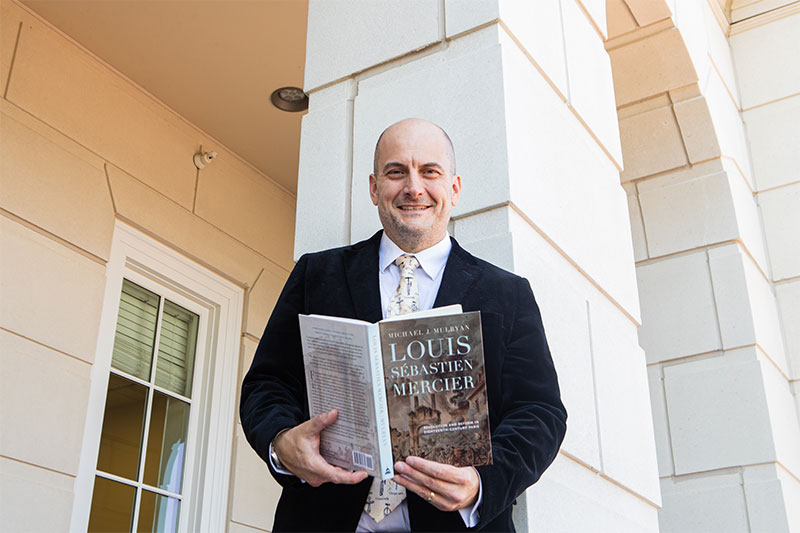
Read time:
Louis Sébastien Mercier’s keen observations about people, society and politics are as relevant today as they were hundreds of years ago, according to Dr. Michael Mulryan, Professor of French and French Literature. In fact, the professor admits he often uses Mercier’s musings and ideas to help him navigate his own life.
“I often refer to Mercier’s work when I’m considering, ‘Am I doing the right thing?’ and ‘Am I speaking out the way I should?’,“ said Mulryan. “Mercier was extremely insightful. He has influenced me in countless ways.”
Although Mercier was born in 1740, Mulryan believes the philosopher’s observations are still applicable and resonate in modern times. Mulryan researched and wrote his new book, Louis Sébastien Mercier: Revolution and Reform in Eighteenth-Century Paris, to appeal to both academics and everyday readers.
“Mercier was way ahead of his time,” Mulryan said.
A prolific writer and astute observer, Mercier lived in Paris and studied social injustice. He would often walk the streets and sit in cafes just to listen to conversations and gauge people’s viewpoints and concerns. His urban chronicles, Tableau de Paris and Le Nouveau Paris, dissected the city from all angles: the educational system, the location of hospitals, the way the poor were treated, and ways to innovate schools.
“He spoke his mind,” Mulryan said. “Skepticism, he believed, was one of the greatest qualities of an enlightened thinker. He also had a very strong moral compass.”
In his classes, Mulryan applies Mercier’s teachings by asking students to write, in English and in French, an urban tableau about an aspect of everyday life on the Christopher Newport campus.
“It has to be keenly observational and generally contain a recommendation for reform,” he said.
Mulryan says Mercier tried to change society for the better by promoting equality and advocating for those who were marginalized.
“His heart was in the right place,” Mulryan said.
Mercier considered Paris a microcosm of the world, using it as his classroom to study its problems, politics and societal problems. He would then write down his thoughts about what was wrong, and his ideas on how to resolve the issues. His opinions on how to narrow the rift between rich and poor influenced the work of Dickens, Hugo, and Balzac. The way Dickens portrays the working class in A Tale of Two Cities is in part derived from Mercier’s works.
Mercier also studied how people treated each other. He was convinced that laborers such as shoe shiners, rag pickers and water carriers, contributed significantly to society and deserved as much respect as the wealthy. He also felt that simply speaking kindly to each other and taking a stand against injustice were both critical components of the advancement of society.
“He believed in social equality. He had so many examples in daily life where people we depend upon deeply go completely unacknowledged, Mulryan said. “What he said hits close to home. I think writers like Mercier keep us honest, even when we don’t want to be.”
Mulryan strives to adhere to Mercier’s rule that one should never assume or make judgements based on what someone does for a living. He urges his students to do the same as they craft their own urban tableau.
“I have the students consider how the campus community is interconnected and how we rely on each other for things to function normally,” he said. “We rely on the Information Technology Department and employees who clean buildings just as much as we do on instructors and students.”